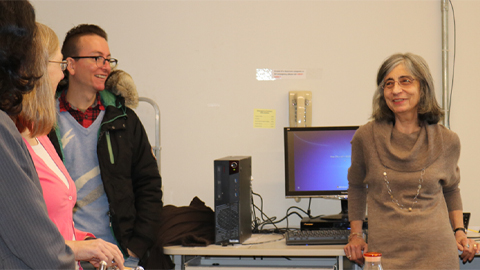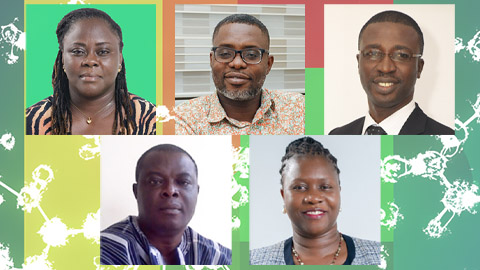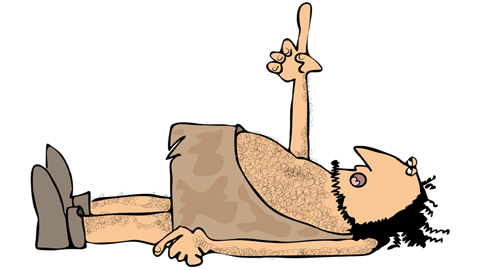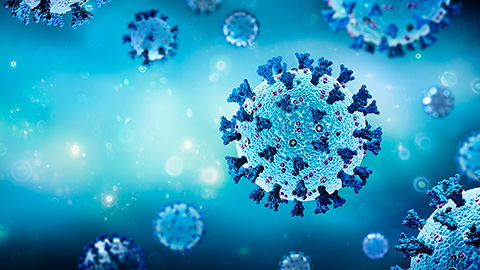Getting certified in DEAI
Stepping out of my comfort zone has been a theme throughout my career journey — from switching labs in my sixth year of graduate school to switching careers from bench research to diversity, equity and inclusion after defending my thesis in 2020. Leading the staff of the American Society for Biochemistry and Molecular Biology through a seven-part course that included challenging conversations and self-reflection about diversity, equity, accessibility and inclusion in the workplace has been the latest step in this journey.
My background
When I tell people that I used to do neuroscience research and now work in DEI, I often get puzzled looks; they are shocked that I would stop doing research. Research is very stressful, especially for students of color, like me, who not only have to ensure that experiments are properly run but also have to deal with microaggressions and the added pressure of feeling we must be perfect to prove that we belong. In graduate school, I constantly felt impostor syndrome, and I knew I wasn’t the only student with this feeling, so I took action.
I served as co-president of the Diversity Interest Group at the University of Massachusetts Chan Medical School. We organized programs that centered on the intersection of personal identity and science — topics not discussed in the lab. I saw so much value in my work with the Diversity Interest Group that I wanted to pursue a career that supported scientists beyond the bench, particularly underrepresented ones.
I next took a postdoc position in DEI at UMass; I planned a program that exposed students from historically Black colleges and universities to the programs at the medical school and created a seminar series that highlighted the research of scientists with diverse backgrounds.
Today, I manage ASBMB’s DEI programs and work to establish new ones.
About the course
Earlier this year, the ASBMB staff took the seven-part University of South Florida “DEI in the Workplace” course. It was my job to moderate weekly discussions.

The course starts by diving into participants’ emotional intelligence and demonstrating that DEI core values are empathy and self-awareness. The content then shifts from looking inward to understanding how DEI efforts can be sustained by and benefit an organization. Each two-hour module has a lecture and a panel discussion with people from a variety of backgrounds describing their perspectives and experiences.
For seven weeks, the staff met in small groups, both in person and virtually, to discuss each module, how DEAI relates to their individual roles in the society and to the ASBMB as a whole, opportunities for DEAI at the ASBMB, and related topics.
I created ground rules, a confidentiality agreement and discussion questions to guide the conversations.
Staff members shared their perspectives and personal stories, which allowed us to get to know one another better. I opened up about my experience with microagressions in graduate school, such as being told after giving a presentation that I spoke so well, as if it was a surprise that I used proper grammar. Of course, the comment likely was meant to be a compliment; however, the impact was negative. I had many wonderful experiences in graduate school, but far too often students who look like me experience such microagressions.
Some staff members said they found it difficult to understand fully how a microagression such as “you speak so well” can be offensive; I explained the difference between intention and impact. Some staff members shared stories from their own lives and examined their words and actions through this lens.
A major highlight in the discussions was the topic of accessibility, which often is overlooked. We came up with great ideas to make the ASBMB annual meeting and other offerings more accessible.
Each participant who passes all seven course quizzes receives a certificate badge for their LinkedIn page. After we completed the course in May, I was proud to see staff members post about their experiences.
Evaluation
About a month later, I sent out a survey to obtain staff feedback about the course, discussions and the society’s DEAI efforts in general. I also created a supplementary document with notes from each module to help respondents complete the survey.
The survey results indicated that the overall experience was positive. The module about stereotypes and biases was rated as the most helpful; it spurred engaging conversations about intention versus impact, and those discussions highlight the importance of having a space where people can ask uncomfortable questions without fear of judgement.
One staff member commented, “For me, the best outcome was getting to know my colleagues better, in particular the new ones. We’ve had a lot of new hires in the past couple of years, and I hadn’t had the chance to get to know them really. The discussion groups, either in person or on Zoom, removed barriers. If I saw someone in my group in the break room or hallway, it was nice to know we had a shared experience.” This type of interaction is invaluable, especially after the limits imposed by two years of fully remote or hybrid work.
Reflection
Moderating the group discussions was fantastic professional development for me, and I am glad I did it.
One major thing I learned from facilitating the discussions, especially on sensitive topics, was to allow time for silence. I hate awkward silence; it makes me very uncomfortable. Nevertheless, continuing the theme of stepping out of my comfort zone, I had to learn to get comfortable with the uncomfortable and allow time for staff to think about their responses.
I gained confidence about my ability to lead discussions and create space to be vulnerable, and I appreciated the opportunity to connect with my co-workers on a deeper level than our brief “How was your weekend?” morning chats in the office kitchen.
I learned more about the various roles of staff members as we brainstormed ways we could integrate DEAI in their work. This knowledge, and feedback from the survey, will help to establish a general framework for the ASBMB’s DEAI initiatives.
Moving forward
The course and group discussions are only the beginning of the ASBMB’s journey in DEAI. We plan to take a deeper dive into DEAI with the help of a consultant and develop a DEAI strategic action plan for the society.
I would like to see the ASBMB become a leader in integrating and supporting DEAI in the sciences.
Enjoy reading ASBMB Today?
Become a member to receive the print edition monthly and the digital edition weekly.
Learn moreFeatured jobs
from the ASBMB career center
Get the latest from ASBMB Today
Enter your email address, and we’ll send you a weekly email with recent articles, interviews and more.
Latest in Opinions
Opinions highlights or most popular articles

Learning to listen
In her talk at DiscoverBMB, ASBMB Sustained Leadership Award recipient Adele Wolfson reflected on the increased inclusiveness of science in recent decades.

Getting to know scientists half a world away
In a program at Wellesley College, students interview and write about researchers at a university in Ghana.

Let’s make ASBMB awardees look more like BMB scientists
Think about nominating someone outside your immediate network.

A paleolithic peer review
You might think review panels have only been around for the last century or so. You would be mistaken.

Early COVID-19 research is riddled with poor methods and low-quality results
The pandemic worsened, but didn’t create, this problem for science.

So, you went to a conference. Now what?
Once you return to normal lab life, how can you make use of everything you learned?

